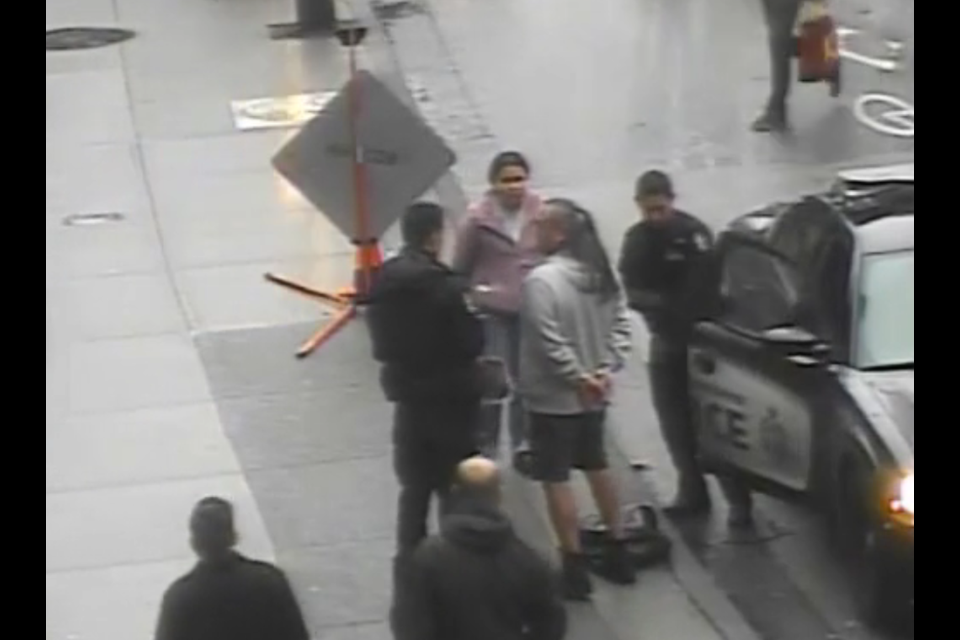Following a traumatic and humiliating incident that took place two years ago, two Heiltsuk Nation members have more supporters in their corner.
One rainy Friday in December 2019, Maxwell Johnson and his then 12-year-old granddaughter Torianne Tweedie stopped by a Bank of Montreal location in Vancouver to open a bank account for Tweedie. When they handed their Indian status cards over to identify themselves, the bank noticed some discrepancies on Tweedie’s card and the pair were flagged as possibly being fraudulent. That prompted a phone call which led to two Vancouver police officers detaining them both outside the bank, handcuffing and searching them.
The incident was widely covered with condemnation being thrown to BMO’s fraud practices but also to the VPD’s use of handcuffs. Both organizations offered up statements addressing their respective behaviours with Vancouver’s mayor Mayor Kennedy Stewart, who also serves as the chairperson of the Vancouver Police Board, accusing BMO of misleading the VPD.
An investigation was also launched into the VPD’s operations in relation to the incident.
Complaints to the BC Human Rights Tribunal
Johnson and Tweedie filed complaints with the BC Human Rights Tribunal and the Canadian Human Rights Commission.
The complaints are against BMO and the VPD “to hold the institutions responsible for systemic racism, and to make broader social change.”
Wednesday (June 16) an update to the human rights complaint was made during a media availability with leaders of the Heiltsuk Nation and representation for the Union of BC Indian Chiefs (UBCIC).
Mary Ellen Turpel-Lafond, a Canadian lawyer and former judge, announced on behalf of Grand Chief of the UBCIC Stewart Philip the union would be launching an intervention into the complaints.
"The significance of the Union of British Columbia Indian Chiefs intervening in this matter is because the full support of the organization… with a large number of chiefs in British Columbia have marshalled together to stand with Maxwell and his granddaughter,” Turpel-Lafond said.
Turpel-Lafond added the intervention is also being made to support Marilyn Slett, Chief Councillor of the Heiltsuk Nation “to ensure that the racism that is being reported in the Vancouver Police Department in its interaction with indigenous people... with Indigenous, Black and people of colour is exposed and is addressed."
'It'll be with us for a while yet'
Along with the announcement came CCTV footage of the detainment outside the BMO location.
Johnson answered questions from reporters regarding his and his granddaughter's experience during and since the incident.
"It's been pretty hard the last two years going through what we went through with the BMO and the VPD,” Johnson said. "It’s very hard when we get updates from our lawyer’s office and we read what's happened to us and see the video."
Johnson says viewing the video, even after two years, opens up old wounds.
"The first time we saw the footage of us being taken out of the bank in our lawyer’s office in Vancouver was very very hard to see,” he said. "It'll be with us for a while yet."
'Now my granddaughter has anxiety'
"Prior to this happening I suffered from a mental illness called panic disorder. I took some time off from my counsellors -- I used to see three different counsellors three times a week but after this happened I had to go back into counselling and my anxiety went back up and now my granddaughter has anxiety," explained Johnson.
Wednesday's conversation addressed the issue of systemic racism in the VPD, a notion that Vancouver Police Cheif Adam Palmer has denied -- going so far as to call it "offensive.”
"The very fact that we're still here today talking about a submission to the human rights commission and that one of our largest Indigenous political organizations are intervening signifies and symbolizes that racism exists, it’s systemic, it’s in all of the institutions across British Columbia and Canada," said Slett.
"We don't agree with statements being made that [systemic racism] does not exist within the Vancouver Police Department,” Slett continued. “It is very alive and this is something why we're here today to stand up against that and do everything we can to stop it and make those changes that need to be made."
Stong as Cedar
Slett pointed to the Strong as Cedar campaign which was formed so others could share their stories of racism and discrimination in support of Johnson and his granddaughter.
“Let's stand together, tall and strong like cedar, against racism," she said.
As for what the UBCIC is seeking from the human rights tribunal, Turpel-Lafond said a meaningful apology paired with action would be a good start.
"When institutions can't own the racism and are not accountable for it, it continues to hurt people and that's the key piece,” Turpel-Lafond said. “Apologies need to be there, they need to be more than words and they need to be unequivocal and meaningful."
'Sick and tired of meaningless apologies'
Phillip made his perspective clear: "We're sick and tired of meaningless apologies that are made in a very high profile political fashion and there's absolutely no opportunity for redress for compensation," he said.
The intervention is to be filed this week
The UBCIC must then wait to see if the Vancouver Police Board consents to the intervention. If not an argument may be needed.
The tribunal has not yet set dates to hear the case.




